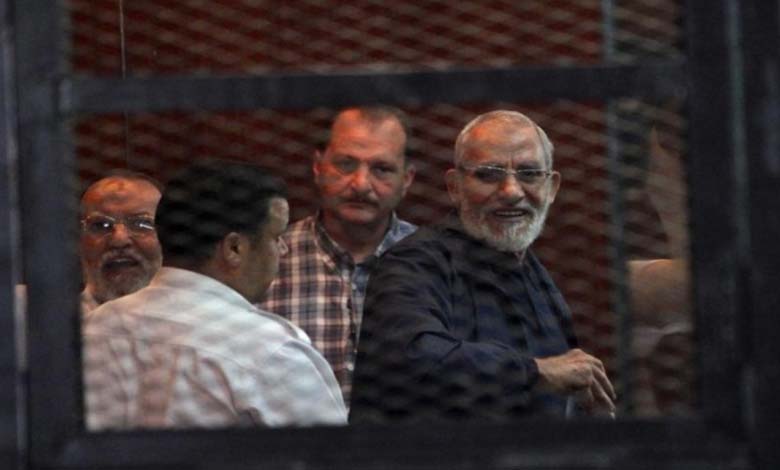Brotherhood Initiative to Seek Pardon in Exchange for Withdrawal from Politics
The Deputy General Guide acting for the Brotherhood retracts his initiative following widespread criticism within the group, denying any call for withdrawal from politics, considering it one of the principles of their reform project.

A senior official of the Egyptian Muslim Brotherhood called on the authorities to grant amnesty to its members in exchange for their withdrawal from politics. However, he quickly retracted the initiative amidst criticism, claiming it had been misinterpreted, while political leaders viewed the call as a declaration of surrender from the group, which is classified as a terrorist organization, and others warned against such proposals.
-
“Year of Lies and Blood”: Major Terrorist Crimes Committed by the Muslim Brotherhood in Egypt
-
A new slap to the Brotherhood in Egypt; The failure of calls November 11 marks the end of the terrorist organization
Majed Abdullah, a journalist from the “Al Sharq” channel broadcasting from Turkey and close to the group, stated that Helmy El-Gazar, the deputy of Dr. Salah Abdel-Haqq, the acting General Guide of the Brotherhood, had officially asked him to convey a message through his channel, requesting the Egyptian authorities to release political prisoners in exchange for a complete withdrawal from politics. This request led El-Gazar to issue a response minimizing the significance of the message.
According to available information, the Brotherhood called for the release of their imprisoned members, with Majed Abdullah confirming that El-Gazar, residing in London, had asked him to present the message to the Egyptian authorities through his channel. El-Gazar reportedly stated that the Brotherhood was prepared to “refrain from political activity for a period of 10 to 15 years and to forget the events of the past 11 years since the fall of their government in June 2013.”
-
The Muslim Brotherhood’s crimes “will not be forgotten” … Egypt thwarts the group’s plans to sell Sinai
-
Egypt’s Muslim Brotherhood decided to confront the police and any opponent… a confession exposes the group’s plots
After the dissemination of this information, the acting Deputy General Guide issued an official statement saying that the group’s announced and maintained non-competition for power does not in any way mean a withdrawal from politics, which remains a core principle of the Brotherhood‘s reform project. He emphasized that the Brotherhood is an integral part of the Egyptian people, defending their political, economic, social, and cultural rights in all fields, and that they will not abandon this mission as a religious and national duty. He clarified that the call to cease political activity – surrounded by rumors and speculations – confirms a rejection of political pluralism in favor of a unipolar system of governance.
-
Rumors of the Muslim Brotherhood Reach Raba’a and Nahda… Egypt Denies
-
Did the Muslim Brotherhood aim to destroy the Egyptian identity? Details
He also affirmed that the Brotherhood had previously announced that anyone who extends a hand to them would find only loyalty from their side, and that they welcome any serious initiative aimed at freeing political prisoners, calling on politicians and media to verify information from official sources of the group, which has denied any other statements.
Hundreds of soldiers, police officers, and civilians, both Muslims and Copts, have been killed in terrorist attacks following the fall of the Brotherhood‘s government, while fleeing Brotherhood leaders abroad have led campaigns inciting violence to overthrow the regime, and hundreds of the group’s leaders are being tried on terrorism-related charges.
-
The “Hasm” movement of the Muslim Brotherhood aimed to overthrow the ruling regime in Egypt… How?
-
Lies and Allegations: The Muslim Brotherhood Exploits the Palestinian Issue to Undermine Egypt’s Image
This call from the Brotherhood‘s leadership reveals a division within the group after a group of loyal youths announced their dissent and disavowal of the group’s ideas as part of several reviews. In 2019, a group of young members of the movement contacted the authorities for reconciliation, sending a letter from 1,350 members of the group imprisoned in Egyptian jails, requesting amnesty and withdrawal from politics.
In response to Majed Abdullah’s statements, Deputy Mostafa Bakry said that it had “caused a heated debate and sharp disagreement among the group’s members,” emphasizing that “the launch of this initiative is evidence that the group has reached a stage of despair and the end of its project to return to power, losing its popular support and realizing that the revolutionary project against the regime in Egypt has failed, with public confidence in all their proposals being almost non-existent.”
On the other hand, Alaa Mubarak, son of the late President Hosni Mubarak, warned against accepting the call, stating in a post on his official “X” account that there is no safety with religious merchants.
This information indicates the decline of the Brotherhood era with a reduction in their influence within Egyptian society and a significant weakening of similar organizations in several Arab countries, amid reconciliations between Cairo and Doha and Ankara, the main supporters of the group.
Egyptian President Abdel Fattah el-Sisi launched a national dialogue program aimed at achieving national reconciliation excluding the Brotherhood. The Brotherhood has launched numerous reconciliation initiatives with the Egyptian regime in recent years, but Sisi has largely ignored them, insisting on continued security measures against members of the banned group due to the threat they pose to Egyptian national security.












